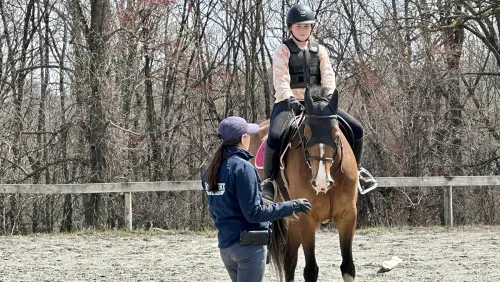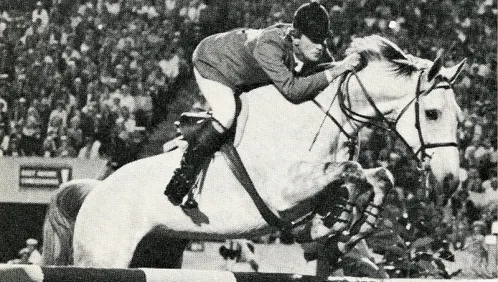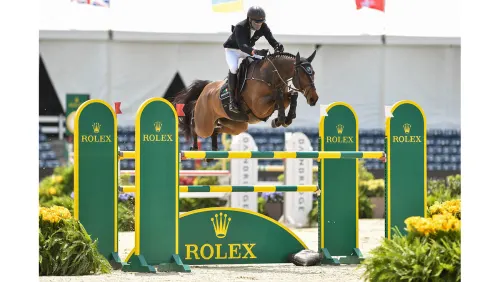Each year following the major equitation finals, there is a great deal of debate about the formats, the courses and the judging. The 2016 Pessoa/U.S. Medal Final was an excellent example, where many praised the course, while others had major issues with the scope and technical aspects.
The Platinum Performance/USEF Show Jumping Talent Search Finals, Medal Finals and ASPCA Maclay Finals are championships for equitation. A championship is supposed to be an event that you have qualified for, and it should be difficult to pick out the best person. I thought the courses this year were wonderful. A clear-cut winner came out.
As the chairman of the USEF Talent Search Task Force, I know that a lot of riders had a great deal of trouble at the Talent Search Finals because they weren’t at the right level for the event.
Mary Lisa Leffler and Jimmy Torano’s Medal course was difficult for the majority of the riders, but it shouldn’t have been that difficult if the riders were prepared correctly. I have judged several times, and I think there is a flaw with the Medal Final format. It is a very long day — starting at 4:30 a.m. The judges have to be there to set the courses, and you don’t usually walk out until 6:30 p.m. There is not much of a break, and it is very strenuous. You are doing that all day long to select 40 people out of almost 300. There are a lot of people that really and truly are not quite ready for the event yet. When I have judged it, the courses have been difficult, and I have gotten some criticism about it, but I also got very clear-cut winners.
Paring Down The Numbers
The Medal could learn a little from the Maclay. The Maclay has done a good thing by holding regionals, creating a more prepared pool of riders for the finals. For the Medal, the U.S. Equestrian Federation canvases the country for qualified riders, but those riders are not getting qualified on the same playing field. Some are qualifying at little shows with only a few riders, while others get qualified at the most difficult competitions, and those are usually the people who are very good. Those top riders actively seek out the top competitions to put themselves in a position to beat the others.
ADVERTISEMENT
I think the criticism shouldn’t cover the judging of the courses at all, but how these people actually qualified.
When I was growing up, anything at the top was very difficult to achieve. If you wanted to go to Madison Square Garden for the National Horse Show as a hunter there were only 10 spots available. It was very difficult, and it was a great honor. When you got there and there were only 10 people, you knew that you were with the very best.
I am not suggesting that we only have to have 10 entries at the Medal Finals, but it could be pared down by half, which falls on the shoulders of show management and the Equitation Committee. A lot of the people who were complaining about the numbers are in a position to make changes, and I think they need to take a closer look at it.
At the top levels of the sport, if you want to go somewhere very special, whether it be the World Cup Finals, the World Championships or the Olympic Games, you must go through difficult qualifying situations to ensure that you are capable of competing at that level. The same approach should be taken for the equitation finals, as they are also championship events. The riders need to learn the importance of correctly qualifying for championships at the beginning of their career if they hope to continue in the sport.
It’s Not About The Trainers
A lot of trainers’ livelihoods depend on helping riders get to the finals. Whether the riders win, lose or draw, the trainers sold the kid a horse, trekked it all over the country, and charged them a lot of money just to say the experience was great.
ADVERTISEMENT
However, I don’t think the experience is all that great if the rider or the horse go in the ring and are not prepared. The parents have spent thousands and thousands of dollars, the kid is embarrassed, and the trainer is standing there saying, “Oh well, it was a great experience.”
This is an excerpt from the article “Making The Equitation Finals True Championship Tests” by Ronnie Beard, which appears in the Nov. 21 issue of The Chronicle of the Horse. If you’d like to read the article in its entirety, you can subscribe and get online access to a digital version and then enjoy a year of The Chronicle of the Horse and our lifestyle publication Untacked. Or you can purchase a single issue or subscribe on a mobile device through our app The Chronicle of the Horse LLC.
If you’re just following COTH online, you’re missing so much great unique content. Each print issue of the Chronicle is full of in-depth competition news, fascinating features, probing looks at issues within the sports of hunter/jumper, eventing and dressage, and stunning photography.
See the entire current issue’s table of contents.
What are you missing if you don’t subscribe?
















